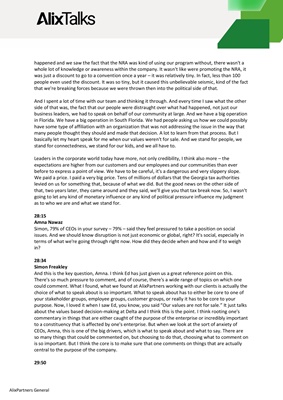
very real discussion, and I think a very important discussion. I must say, Michael, might have a
different view, I haven't heard of anybody making a breakthrough in terms of how to do that in the
programming of LLMs or the sanitizing of the data on the back of which these programs learn. But
what I am really pleased about is that the whole discussion, as you say, about how do we use this as
an opportunity to further take bias out of the system, is a very live debate and I think a very
important debate.
24:47
Michael Kratsios
Yeah, what we tend to see is that if you are seeing or evaluating bias at the end of the road, at the
output of the model, you probably already have lost. The way that you tend to think about this is
you need to be evaluating and thinking about these questions at the beginning of the process, on
the initial data that you're using to train the model itself. So, we have spent, Scale as a company has
spent many of the years, even pre LLMs, thinking about this problem and the best way we have
found to solve it is you have to run your testing and your evaluation on the initial data sets before
the model is even trained. And at that point you can have a good sense of what does the data look
like? Is it skewing in a certain direction that doesn't seem right for whatever reason? And then from
there, once the data is in a position where you think it accurately reflects the direction that you
should be going for your particular use case, then you can start training the model. So for us, it's
data first, always, and if you're worrying about it ten steps later, it's a bit of a mistake. You may be
too late.
25:54
Simon Freakley
Just in terms of a pre digital example, and I'm sure you're aware of the example, but classical
orchestras, classical music orchestras were just appallingly undiverse. And so, people started to
rightly ask the question in 70s, and the 80s, and then the 90s, why is it that the best orchestras of
the world are almost entirely populated by middle class white men? Where's the diversity in classical
music? Surely there are brilliant musicians, female musicians and people of color. And so, the main,
most prestigious classical music orchestras in the world started to do these blind auditions, whereby
they would have, when they were auditioning for chairs in the orchestra, they'd have people come
onto the stage behind a screen, so they couldn't see their ethnicity, they couldn't see their gender.
And then people realized that unconsciously, people were picking up from the click of the heel as
they walked across the stage behind the screen, whether it was a female heel or a male heel. And so
even though it wasn't conscious that actually the unconscious bias was still taking shape. And so,
then they further enhanced this by having a carpet where the person could walk to the spot, so you
couldn't either hear the click of the heel or see the person. And surprise, surprise, here we are in the
2020s and we have much more diverse orchestras today than we had even 20 years ago. And so, the
very deliberate act of seeking how bias can creep into decision making and then doing repetitive
steps to take it out, whilst in a nondigital world the classical music story illustrates it, in the digital
world, there are just different techniques. I think we have to be as deliberate in our attempts to
keep the bias out of the data on which these models learn as we do about the output of the choices.
And I think this is, what I'm thrilled about personally, is that we are very focused on this as a
Western society to make sure, to the extent possible, we use this as a way of averaging up our
performance to take out bias from decision making rather than just repeat our errors of the past.
28:09
Amna Nawaz